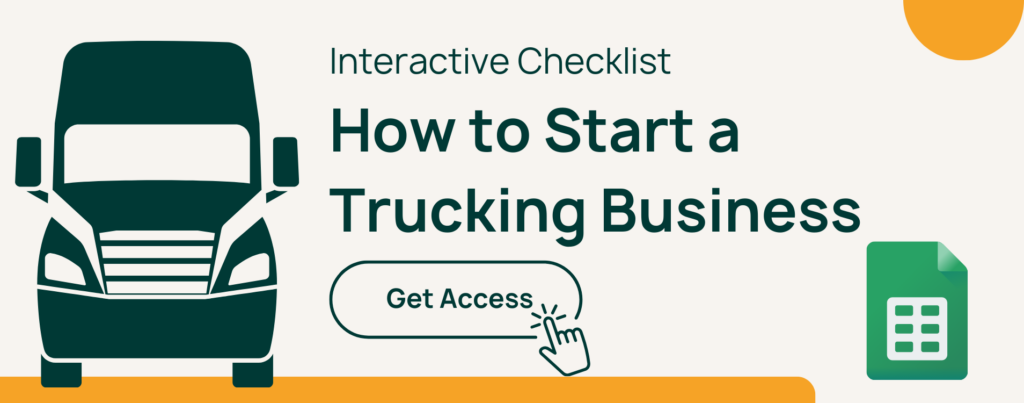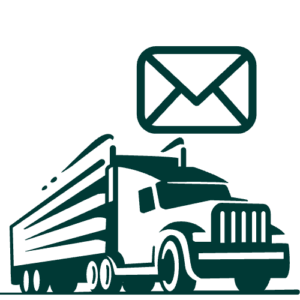
So, you want to buy a semi-truck? That’s great. When done right, trucking can be a great business with lots of opportunities for growth.
When you buy your first semi-truck, the options can be overwhelming: what type of truck? What brand should I get? Should I save to buy in cash or finance with a loan? Used or new?
Before we get into answering all these questions, let’s get something clear. If you’re very new to the trucking industry (less than 1 year of experience), we recommend being a company driver for 2+ years before starting your own business.
It’s true that your earning potential as a driver is lower as a driver relative to an owner-operator in most cases. But your earning potential as an owner-operator without a solid base of knowledge about the industry is $0.
In your time as a company driver, you will be able to get up close and personal with trucking as a business, and, if you’re able to live well below your means, save enough for a down payment or cash purchase.
If you’ve already been driving trucks for some time and you’re ready to get into your very own, these questions have likely crossed your mind:
- What kind of truck should I buy?
- Where should I buy my truck?
- What are my options for financing?
- How much does it cost to finance a truck?
- How can I improve my credit score if financing isn’t an option for me yet?
So let’s begin.
What Kind Of Truck Should I Buy?
We’ve spoken to thousands of new trucking entrepreneurs looking to become owner-operators and this is the question we get more often than any other.
Unfortunately, it’s the wrong question to ask. The right question is: “What business should I run?”
Once you know what type of business you want to have, choosing a truck will be quite simple. Here are three questions you want to ask yourself:
- What do I want to haul? This will determine the needs of your trailer and the power you need.
- Where do I want to go? Consider terrain, distance, and weather.
- What am I authorized to operate? Tankers? Hazmat?
Answer these questions and the type of truck will follow.
Want to do local deliveries? A box truck is probably your best bet. Refrigerated food? Then you’re going to need a reefer. Overweight loads? You’ll need an engine with more horsepower.
Are you a new CDL A driver looking to haul general freight? You might want to look into dry vans.
Are you going to be on OTR routes, spending most of your waking hours in the truck? You’ll want to save up for a truck with more of the comforts of a home.
Dreaming of growing to a large fleet? Access to parts will be key, so you may want to go with Freightliner. Peterbilt and Kenworth trucks are more luxurious and smoother to drive, but they are more expensive to maintain.
This is where your trucking business plan comes in to inform what kind of company you want to run and the plans you have for the future.
There is no one-size-fits-all truck for every business because trucking is a diverse industry with many different niches. What industry needs will your business serve?
Once you know what type of truck you need for your business, you may have some lingering questions…
Should I buy used or new?
For most new owner-operators, there’s probably not much of a choice here because buying used is the only affordable option. In fact, there’s quite a large market for used trucks. This is because large carriers, like Prime, buy new trucks and only use them for 3-4 years.
These make up the majority of the used trucks in the market and, for the most part, are found in really good condition because they’ve gone through all the preventative maintenance processes of a large carrier.
Buying a new truck has a hefty price tag, but it’s not for nothing. New trucks come with extensive warranties, covering a lot of issues that you would end up paying a lot of money for with a used truck.
How much power do I need?
Finally, you may wonder how much power you need for your truck’s engine. This comes back to the questions about your business: what kind of freight will you haul?
Some new trucking business owners make the mistake of buying as much power as they can so that they’re ready to haul anything. However, the more powerful an engine you have, the more fuel it will cost to run. Instead of buying a truck that’s ready for “anything”, plan out your business and let the type of truck (and engine) follow.
What brand should I buy?
Approach this decision with some real research: understand the main issues with the manufacturer, make, model, and year of the trucks you’re considering. The same exact truck made in 2020 will not necessarily have the same performance as the one from 2019.

Where should I buy my truck?
Now that you’ve consulted your business plan and know what kind of truck you need, your best bet is to establish a relationship with a local dealership.
When you’re buying your first truck, you probably don’t have a lot of money. But, at his stage, you have something even more valuable: time. When you become an active business owner, time will become very scarce. So take advantage of the time you have now and visit multiple dealerships in your area to meet the people and get to know what they offer.
Buying from private sellers is also an option but be wary of deals you see online and always get a pre-purchase inspection (PPI). Any dealer or seller that won’t allow a PPI is a giant red flag – DO NOT buy from them.
If you find a great deal on the exact truck you want, but it’s too far away, you can always ask the dealer or seller for a video call so you can see it inside and out before making a decision.
What are my options for financing?
When you get a truck for your business (or any vehicle for any reason, really), you have three options:
- Buy with cash
- Finance with a loan
- Lease from a carrier
Buying in cash
This means you have the money up-front to buy the truck without getting a loan. If you have the cash saved to buy a truck, this can be a good option. It’s especially good if you don’t have a great credit score (below 700) and you know you want to be in business for at least the next five years.
However, buying in cash means you will need to plan out your finances in such a way that you don’t blow every cent on the truck. Remember that there are quite a few other upfront costs to starting a trucking business and your costs of operation will make money tight, especially in the first year.
Financing with a loan
Financing a truck with a loan will require a significant down payment (usually 10-25% of the value of the truck). You’ll then have a monthly truck payment that includes interest on the loan. This is a great option as long as you have good credit (above 700).
Financing means you don’t need to spend all your savings in one go and you can deduct the truck payments and interest from your income when tax season rolls around. However, if your credit score is not great, you’ll either get a really high-interest rate or be denied altogether.
Leasing
Finally, leasing a truck can be a good option if you’re not sure how long you want to stay in the trucking business or don’t have good credit or savings. Financially speaking, a lease is the least favorable option because you’ll pay a fee to lease the truck as well as a percentage of your earnings to the carrier.
Leasing also means you are tied to one carrier and will need to depend on them for loads and abide by their lease agreement, which can restrict mileage. Unfortunately, there are many bad deals in the leasing world, so only agree to lease with a highly reputable carrier.
To decide which option is the best for you, here are the considerations to make:
- How much do you have in savings?
- What’s your credit score?
- How much risk are you willing to take on?
- How long do you want to be in the trucking business?
If you don’t have much in savings, buying in cash is pretty much out of the question. You may be able to find a very inexpensive truck to buy in cash, but depleting all your cash savings is the last thing you want to do when starting a business. If you buy a less expensive or older truck, you’re sure to make it up in maintenance costs.
A mediocre or bad credit score could mean delaying becoming an owner-operator altogether. If you can get a financier to approve a loan with a credit score of less than 600-640, it likely has an astronomically high-interest rate. You will be better off buying in cash (if you have the savings for it), leasing, or staying on as a company driver while you save and improve your credit score.
If you tend to be more risk-averse, you may prefer to save your pennies and buy in cash. This way, you’ll reduce your monthly expenses and improve your business’s cash flow right away.
Finally, if you’re not sure you want to be in the trucking industry on a long-term basis, leasing is your best option for becoming an owner-operator. It will give you a taste of being a business owner without a long-term commitment or depreciating asset.
What does a loan for a semi-truck cost?
The cost of financing a truck has two parts: the down payment and the interest rate. The down payment is the money needed upfront to drive the truck off the lot. You then pay a truck payment each month, including an additional percentage, the interest rate, until the full amount is paid off.
Once your business is up and running, you’ve established a strong relationship with your financial institution, and you can produce financial reports, you may have better access to lower down payments and interest rates.
As a new business owner, interest rates are based largely on market conditions and your credit score. Gone are the days of 3-5% interest on commercial trucks. Since the federal government is raising interest rates for banks, interest rates for everything continue to rise. That being said, the interest rates quoted in this article are based on market conditions in the fourth quarter of 2022.
If your personal credit score is less than 600, you’re probably better off not financing a truck. Instead, you should save until you can buy in cash and/or work to improve your credit score to finance in the future.
With a score between 600 and 650, you’ll likely need to pay 25-35% of the value of the truck upfront and 10-18% in interest.
If your personal credit score is between 650 and 700, you’ll need 10-15% for the down payment and you’ll pay 10-15% interest.
If you have good or excellent credit (700+), you’ll still likely need at least 10% down, but your interest rate will be in the range of 6-10%.
Where should I look for financing?
Shopping for financing is just as (if not more) important than shopping for your truck. Too many new owner-operators rely on the dealership for financing. It could very well be the best deal in town. Or it could be the worst. You’ll never know if you don’t shop around first!
In fact, you should shop for financing before you shop for a truck. There are two reasons for this:
- You’ll get an understanding of how much financing you qualify for.
- You’ll have plenty of time to decide what financier to go with.
Commercial truck loans are quite different from personal vehicle financing. In fact, most large banks and credit unions won’t finance the purchase of commercial vehicles for small companies.
But not to worry! Here are some places to find financing:
- Call around the truck dealerships in your area and ask what financing institutions they work with.
- Pay a visit to smaller, local banks and credit unions.
- Research “first-time truck buyer programs” at institutions like Amur Equipment Financing, BMO Harris Equipment Financing, Navitas Credit Corp, Daimler Truck Financial, or Calfund LLC.
Once you’ve been in the business for at least 2 years and can produce financial reports, you may be eligible for financing with larger banks like Bank of America, Chase, or PNC.
When comparing financing options, there are a few considerations in addition to the down payment and the interest rate.
Term of the loan
The term of the loan is how long it will take to pay off. You’ll want a term for only as long as the truck is likely to be in good working condition – that’s typically a 3-year (36-month) term at the most.= for used vehicles.
Conditions
Conditions of the loan may include getting a warranty on your truck. Now, a warranty is usually recommended, but the financier may require a specific type of warranty.
Another condition could be an end-of-term buyout, meaning you agree to pay the last 10-15% of the purchase price at the close of the agreement. This is not generally recommended because it’s impossible to know how a business will be going by the end of the truck’s second or third year. Will you have that last 10-15% on hand? Instead, get an agreement to pay off the vehicle outright during the duration of the term.
Other conditions could be hidden in the fine print of financing agreements. Read all agreements carefully!
How to improve your credit score
As we’ve mentioned above, you really shouldn’t plan to finance a semi-truck with bad credit. You will pay an astronomical interest rate and higher insurance premiums or get denied for a loan outright.
But don’t get discouraged – you are not powerless! Just like there’s a lot you can do to kill your credit score, there’s also a lot you can do (or not do) to improve your credit score.
What lenders want to see is that you pay your bills and obligations on time. Here are some steps you can take if you have mediocre or bad credit to improve it over time and increase your chances of getting approved for loans with lower rates:
- Pay credit card bills on time – if you’ve gotten lazy about your credit card payments, now’s the time to set up a reminder every month and get serious about paying at least the minimum, if not more of or the whole balance. Doing this consistently over time will help improve your credit score.
- Pay all child support obligations on time – this is a lesser-known impact on credit. Paying child support on time every month is a good demonstration that you can meet your financial obligations.
- Stop paying with checks – if you have a history of writing bounced checks, it’s better to stop using checks altogether and instead get certified checks or find other payment methods that ensure you have sufficient funds to pay.
- Don’t take on more debt – unless you are absolutely certain you can pay for it, do not take on any additional debt until you’ve paid off what you owe to other creditors. Taking on debt to pay for a specific lifestyle or impulse buys is what puts a lot of people at a disadvantage. Missing payments on debt is the driving force behind a poor credit score.
- Avoid payday or cash advance loans – lenders will often request bank statements and look for a steady source of income. If you’re working as a driver and routing your checks through places like a Money Mart, your bank statements won’t show the bimonthly payments from your employer.
- File your taxes as a truck driver – if you’re not putting “driver” as your occupation on your tax returns, start in the next tax season! This is extra evidence that you are an experienced, reliable truck driver.
If you don’t have good enough credit to get a decent interest rate on a loan to buy your truck, implement these points above, do some more research about how to improve your credit score, and then take at least 6-12 months before you get quotes for financing again.
Depending on the length of your credit history and how many missed payments you have, it can take multiple years to improve your score. Regardless, the best time to start improving your credit is right now since it affects so many other aspects of your life!
Learning how to maintain good credit is excellent practice for the discipline required to start your own business and you will save thousands of dollars in interest.
Regardless of your credit history, once you have a truck and are ready to hit the road, maintaining cash flow in a trucking business can be complicated. Keeping up with payments on fuel, insurance, and driver compensation can be difficult when brokers can pay 30-60 days post-delivery. That’s where Bobtail comes in. We offer the best freight factoring service in the industry with no long-term contracts and no hidden fees. If you’re starting a trucking business, get in touch with us to learn more about how our factoring service can help you stay on the road.

Article By

Keep learning with weekly trucking freight market updates.
Keep Learning






